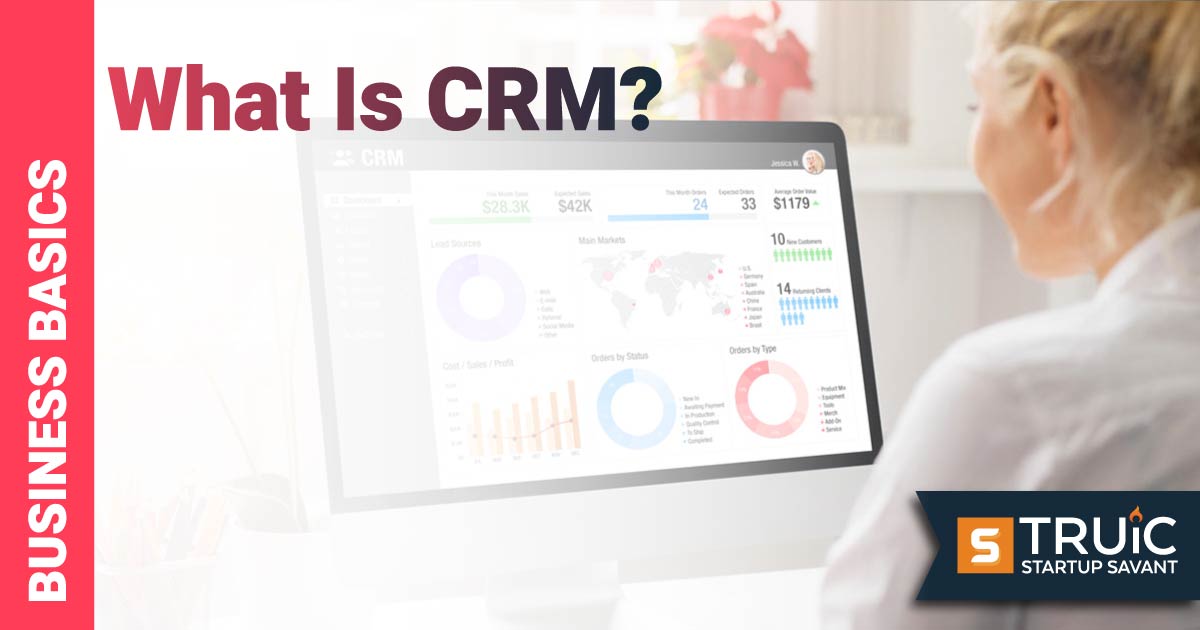10 Primary Benefits of CRM for Startups

Last Updated: By TRUiC Team
It’s no secret that startup founders often have to juggle multiple tasks and responsibilities in order to help sustain their fledgling business, but one of the most important aspects of creating a thriving company is to ensure your customers are well taken care of and happy with your products or services.
Customer relationship management (CRM) tools are an excellent way for startup companies to do just that – keep their finger on the pulse of their customers and understand exactly how, when, and why they interact with their business.
This guide discusses the benefits of CRM and why startups should consider implementing CRM solutions to improve their relationships with their existing and prospective customers.
Recommended: Read our review of the best CRM software for startups!
Why Is Customer Relationship Management (CRM) Important?
Customer relationship management (CRM) is important for startups who wish to build up customer loyalty and trust, ultimately making every single one of their customers feel like they’re heard and understood.
When customers trust your business and know that you have their best interests in mind, they’ll be more likely to purchase from you and even become recurring customers.
You’ve likely heard about “multiple touchpoints” in marketing and how important they are when it comes to growing your sales and bringing in additional revenue. In short, the more your prospects see your business, the more likely they are to eventually interact with your company and take action by purchasing from you.
A touchpoint can be a phone call, email, website visit, physical sign advertising your business, or any similar bits of marketing material that your customer sees about your company. CRMs allow you to contact your prospects and plan out sequences of multiple touchpoints in a very simple and scalable way.
This is the true superpower of CRM tools – their ability to help you scale customer conversations and interactions in a simple manner.
What Are the Key Benefits of CRM Software?
CRM software can provide a wide range of benefits for startup companies, especially if the startup isn’t currently using a Customer Relationship Management solution.
We’re going to walk through several key benefits of CRM software and explore why using CRM tools in your startup can help you expand your business and start on a path toward rapid growth.
1. Form Better Relationships With Customers
Using CRM software can help your startup build a better relationship with your customers since all of your employees will see information about each customer in one centralized location.
If a customer had an issue in the past that was recorded in your CRM, you’ll be able to immediately get ahead of the problem and work with them on a resolution. If your customer frequently purchases one type of product or service on a regular basis, perhaps your sales team can reach out to them with similar offerings and offer them a coupon or loyalty bonus.
The possibilities for improving customer relationships are endless when you understand your customers' wants, needs, desires, and past behaviors.
2. Improve Sales Rep Organization and Productivity
When sales representatives have to work with multiple tools, software packages, documents, or storage locations, their organization and productivity may suffer.
CRM software aggregates all of this information into one central dashboard where all of your employees can pull up relevant information with just the click of a button. If your sales reps are currently struggling with finding customer information or searching for documents relevant to past sales or prospective sales, it’s a tall order to expect top performance.
A CRM tool can significantly improve the lives of your sales representatives and empower them to focus on selling your startup’s products and services instead of battling the minutiae and trying to track down files or information in the process.
3. Gain Valuable Customer Data
When your business sets up your CRM, you’ll be able to add or import all of your existing customer data into one centralized database that can be accessed by your sales teams or employees.
Most CRMs will then analyze your customer’s behaviors and have the ability to generate reports that illustrate how they react to certain marketing campaigns, which products or services they frequently purchase, or how engaged they are with your startup based on their history of interactions with your company.
Your company can use this valuable CRM data to make informed business decisions and stay on top of your customers' wants, needs, and desires.
4. Pattern Matching to Identify More Leads
CRM tools allow you to perform pattern matching and automatically filter, score or route certain leads to the appropriate salesperson or department.
This is incredibly helpful when your startup has a certain type of lead that you place a very high value on, and you know that this type of lead is more likely to convert and generate a significant amount of sales for your business over time.
With CRM pattern matching, you can automate the process of singling out these types of leads and get them assigned to the appropriate team members with high priority. One of the biggest mistakes some salespeople make is to leave too much time between when a lead first expresses interest and when an outreach attempt is made.
By using pattern matching and identifying high-quality leads right after they express interest in your startup, you’ll be able to significantly increase your closing rate and generate increased sales as a result.
5. Boost Sales
CRMs are built with marketing departments in mind and can help your startup company boost sales of your products or services.
Since the primary goal of CRM tools is to optimize your interaction with prospects or customers, connecting with them on time and spending more time replying to their queries or requests makes it more likely that they will purchase.
The simple act of answering all of a customer’s questions in detail and being there as they ask questions and investigate your products and services makes it increasingly likely that they’ll convert and your business will close a deal with that customer.
Best CRM Software
Looking for the right CRM system for your company? Click below to visit our review of the best CRM for startups!
6. Automate Tasks
Instead of working on repetitive tasks that take up valuable time without productivity gains to show for it, why not automate everything that’s mindless and repetitive and claim that time back?
CRM automation lets your startup do just that by opening up more opportunities and streamlining your workflows, letting you focus only on what’s truly important.
You can automate your marketing, where follow-ups are sent automatically after a certain period of time or when your customer interacts with a certain page or opt-in form on your website.
Certain CRMs allow you to automate your social media, content marketing, and email marketing, letting you schedule posts or messages in advance and optimize your inbound marketing strategy.
You can also automate your lead nurturing process through a series of workflows you create ahead of time and even your report generation processes where your team can see your company’s status and understand how your current strategies are performing in real-time.
7. Increase Customer Satisfaction
Having satisfied and happy customers should be one of the primary goals of your startup, and strategically using CRM software can help you accomplish just that.
By reaching out to your customers and following up with them regularly, they’ll feel like your business has their best interests in mind and is out to help them get their needs met or problems solved.
Furthermore, since you’ll know the whole history of each of your customers, you’ll be able to offer them targeted deals, offers, or bonuses based on how long they’ve been with your company or which types of items they tend to purchase most often.
The opportunities are truly endless when it comes to making your customers happy with CRM software.
8. Manage Your Pipeline
CRM tools are perfect for managing your sales pipeline and letting your sales team know exactly where each prospect is in your sales funnel.
Depending on how advanced you want to get with incorporating your pipeline into your CRM, your business will be able to see all of your marketing team’s interactions with each prospect and exactly how they responded.
You can then prioritize your most engaged prospects and take the additional steps and effort required to convert them into paying customers. Using your CRM to manage your pipeline can save your startup both time and money, especially if you aren’t currently using a software solution to assist with the job.
9. Pass Prospects from Marketing to Sales and Customers from Sales to Customer Success
Since your entire team can see all of your customer and prospect information inside of your CRM, you’ll be able to easily pass prospects from marketing to sales and from sales to customer success as required.
Most CRM software solutions have built-in team chat windows and discussion forums where your team members can post live notes and problem-solve on the go. If one of your employees realizes that a certain customer is ready to be passed onto sales due to the interest they expressed in your offerings, they can easily reroute that contact to your sales team.
Similarly, if a customer wishes to return an item or report a problem with something they’ve purchased, your team will be able to quickly route them to the customer success department for a resolution.
10. Help Manage and Direct Sales Reps
When it comes to managing and directing your sales representatives, keeping tabs on all of them and their progress can be challenging without additional help.
This is where CRMs can truly shine since they can track all of the interactions your sales reps have with prospects. Some CRM tools can show your sales representatives checklists or steps you created that they must follow when working with each customer, ensuring that they don’t miss a step and follow a consistent, standardized process.
FAQ
What is CRM?
Customer relationship management (CRM) software is a type of technology businesses use to help manage all their interactions with prospects and customers. When a company uses CRM tools, they can improve their relationships with customers, see a history of how a particular customer previously interacted with their business, and ultimately increase their profitability and growth due to positive customer relationships.
What are the benefits of CRM software?
The primary benefit of CRM software is its ability to give your employees full visibility into your customers and how they tend to interact with your business. Instead of having customer information spread across multiple documents, files, or storage locations, a CRM system will allow you to see everything in one centralized location and allow your teams to work together more efficiently.
What is the best CRM software?
There are several well-known CRMs that are considered the industry standard when it comes to customer relationship management. Some of the most popular CRMs on the market today include Salesforce, HubSpot CRM, Zoho CRM, and Pipedrive.


